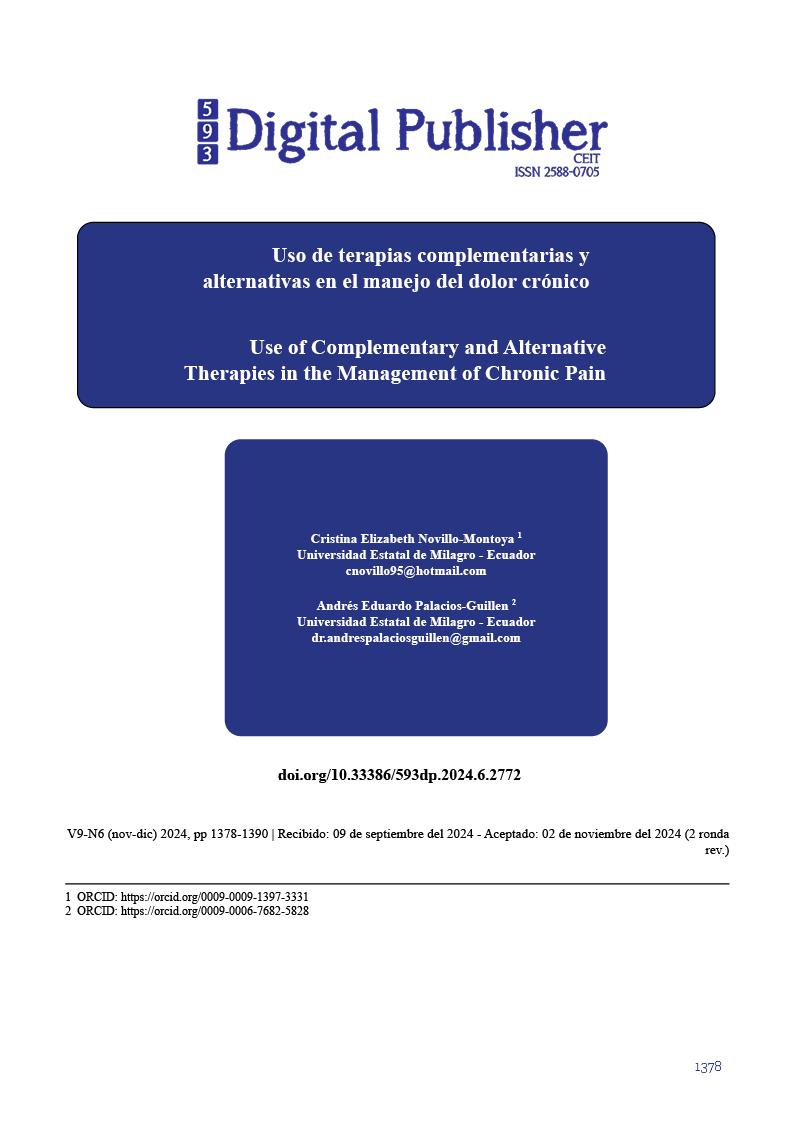Uso de terapias complementarias y alternativas en el manejo del dolor crónico
Contenido principal del artículo
Resumen
El manejo del dolor crónico representa un desafío significativo en la práctica clínica, dado que los tratamientos convencionales no siempre resultan efectivos y pueden generar efectos secundarios adversos. En este contexto, las terapias complementarias y alternativas han ganado relevancia como opciones no farmacológicas para el tratamiento del dolor. El objetivo del estudio es analizar las evidencias sobre la efectividad de estas terapias en el manejo del dolor crónico. Se empleó una metodología cualitativa basada en la revisión documental de literatura científica, utilizando criterios específicos de inclusión y exclusión. La búsqueda se realizó en bases de datos académicas reconocidas, con el fin de recopilar información sobre terapias como la acupuntura, el yoga y la meditación. Los resultados revelaron reducciones significativas del dolor, especialmente en casos de dolor musculoesquelético y neuropático. Se observó que las intervenciones combinadas, como acupuntura y meditación, ofrecieron mayor efectividad en comparación con las terapias individuales. Se concluye que las terapias complementarias y alternativas son efectivas en el manejo del dolor crónico, mejorando tanto la funcionalidad física como el bienestar emocional de los pacientes. Sin embargo, se identificaron limitaciones metodológicas, como la heterogeneidad de los estudios y la falta de datos sobre efectos adversos. Se recomienda profundizar en estudios controlados y longitudinales que evalúen su eficacia en diversas poblaciones y contextos clínicos.
Descargas
Detalles del artículo

Esta obra está bajo una licencia internacional Creative Commons Atribución-NoComercial-CompartirIgual 4.0.
1. Derechos de autor
Las obras que se publican en 593 Digital Publisher CEIT están sujetas a los siguientes términos:
1.1. 593 Digital Publisher CEIT, conserva los derechos patrimoniales (copyright) de las obras publicadas, favorece y permite la reutilización de las mismas bajo la licencia Licencia Creative Commons 4.0 de Reconocimiento-NoComercial-CompartirIgual 4.0, por lo cual se pueden copiar, usar, difundir, transmitir y exponer públicamente, siempre que:
1.1.a. Se cite la autoría y fuente original de su publicación (revista, editorial, URL).
1.1.b. No se usen para fines comerciales u onerosos.
1.1.c. Se mencione la existencia y especificaciones de esta licencia de uso.
Citas
Abdelrahman, K. M., & Hackshaw, K. V. (2021). Nutritional Supplements for the Treatment of Neuropathic Pain. Biomedicines, 9(6), 674. https://doi.org/10.3390/biomedicines9060674
Alemi, S., Abolmaali Alhosseini, K., Malihialzackerini, S., & Khabiri, M. (2021). Effect of Mindfulness Therapy and Aromatherapy Massage on Pain Perception, Quality of Life and Sleep Quality in Older Women With Chronic Pain. Salmand, 16(2), 218–233. https://doi.org/10.32598/sija.16.2.3058.1
Alonso, J., Ferrer, M., Gandek, B., Ware Jr., J. E., Aaronson, N. K., Mosconi, P., Rasmussen, N. K., Bullinger, M., Fukuhara, S., Kaasa, S., & Leplège, A. (2004). Health-related quality of life associated with chronic conditions in eight countries: Results from the International Quality of Life Assessment (IQOLA) Project. Quality of Life Research, 13(2), 283–298. https://doi.org/10.1023/B:QURE.0000018472.46236.05
Amellia, S. W. N., & Utami, R. W. (2021). The Benefits of Prenatal Aromatherapy Massage and Prenatal Yoga in Improving Beta Endorphin and Alleviating Back Pain for Pregnant Women. Proceedings of the International Conference on Health and Medical Sciences (AHMS 2020). https://doi.org/10.2991/ahsr.k.210127.004
Baron, R., Dickenson, A. H., Calvo, M., Dib-Hajj, S. D., & Bennett, D. L. (2023). Maximizing treatment efficacy through patient stratification in neuropathic pain trials. Nature Reviews Neurology, 19(1), 53–64. https://doi.org/10.1038/s41582-022-00741-7
Berntzen, H., Bjørk, I. T., & Wøien, H. (2018). “Pain relieved, but still struggling”—Critically ill patients experiences of pain and other discomforts during analgosedation. Journal of Clinical Nursing, 27(1–2). https://doi.org/10.1111/jocn.13920
Borsook, D., Youssef, A. M., Simons, L., Elman, I., & Eccleston, C. (2018). When pain gets stuck: the evolution of pain chronification and treatment resistance. Pain, 159(12), 2421–2436. https://doi.org/10.1097/j.pain.0000000000001401
Breivik, H., Collett, B., Ventafridda, V., Cohen, R., & Gallacher, D. (2006). Survey of chronic pain in Europe: Prevalence, impact on daily life, and treatment. European Journal of Pain, 10(4), 287–287. https://doi.org/10.1016/j.ejpain.2005.06.009
Briesch, A. M., Swaminathan, H., Welsh, M., & Chafouleas, S. M. (2014). Generalizability theory: A practical guide to study design, implementation, and interpretation. Journal of School Psychology, 52(1), 13–35. https://doi.org/10.1016/j.jsp.2013.11.008
Bryans, R., Decina, P., Descarreaux, M., Duranleau, M., Marcoux, H., Potter, B., Ruegg, R. P., Shaw, L., Watkin, R., & White, E. (2014). Evidence-Based Guidelines for the Chiropractic Treatment of Adults With Neck Pain. Journal of Manipulative and Physiological Therapeutics, 37(1), 42–63. https://doi.org/10.1016/j.jmpt.2013.08.010
Chen, L., & Michalsen, A. (2017). Management of chronic pain using complementary and integrative medicine. BMJ, j1284. https://doi.org/10.1136/bmj.j1284
Cohen, S. P., Vase, L., & Hooten, W. M. (2021). Chronic pain: an update on burden, best practices, and new advances. The Lancet, 397(10289), 2082–2097. https://doi.org/10.1016/S0140-6736(21)00393-7
Colgrove, Y., Gravino-Dunn, N., Dinyer, S., Sis, E., Heier, A., & Sharma, N. (2019). Physical and physiological effects of yoga for an underserved population with chronic low back pain. International Journal of Yoga, 12(3), 252. https://doi.org/10.4103/ijoy.IJOY_78_18
Dada, T., Mittal, D., Mohanty, K., Faiq, M. A., Bhat, M. A., Yadav, R. K., Sihota, R., Sidhu, T., Velpandian, T., Kalaivani, M., Pandey, R. M., Gao, Y., Sabel, B. A., & Dada, R. (2018). Mindfulness Meditation Reduces Intraocular Pressure, Lowers Stress Biomarkers and Modulates Gene Expression in Glaucoma: A Randomized Controlled Trial. Journal of Glaucoma, 27(12), 1061–1067. https://doi.org/10.1097/IJG.0000000000001088
Damien, J., Colloca, L., Bellei-Rodriguez, C.-É., & Marchand, S. (2018). Pain Modulation: From Conditioned Pain Modulation to Placebo and Nocebo Effects in Experimental and Clinical Pain. In International Review of Neurobiology (pp. 255–296). https://doi.org/10.1016/bs.irn.2018.07.024
Deeks, J. J., Higgins, J. P., & Altman, D. G. (2019). Analysing data and undertaking meta‐analyses. In Cochrane Handbook for Systematic Reviews of Interventions (pp. 241–284). Wiley. https://doi.org/10.1002/9781119536604.ch10
Delgado, R., York, A., Lee, C., Crawford, C., Buckenmaier, C., Schoomaker, E., & Crawford, P. (2014). Assessing the Quality, Efficacy, and Effectiveness of the Current Evidence Base of Active Self-Care Complementary and Integrative Medicine Therapies for the Management of Chronic Pain: A Rapid Evidence Assessment of the Literature. Pain Medicine, 15(S1), S9–S20. https://doi.org/10.1111/pme.12412
Deng, C., Xie, Y., Liu, Y., Li, Y., & Xiao, Y. (2022). Aromatherapy Plus Music Therapy Improve Pain Intensity and Anxiety Scores in Patients With Breast Cancer During Perioperative Periods: A Randomized Controlled Trial. Clinical Breast Cancer, 22(2), 115–120. https://doi.org/10.1016/j.clbc.2021.05.006
Dogan, K., & Tornuk, F. (2019). Improvement of bioavability of medicinal herbs by fermentation with Lactobacillus plantarum. Functional Foods in Health and Disease, 9(12), 735. https://doi.org/10.31989/ffhd.v9i12.648
El-Tallawy, S. N., Nalamasu, R., Salem, G. I., LeQuang, J. A. K., Pergolizzi, J. V., & Christo, P. J. (2021). Management of Musculoskeletal Pain: An Update with Emphasis on Chronic Musculoskeletal Pain. Pain and Therapy, 10(1), 181–209. https://doi.org/10.1007/s40122-021-00235-2
Gok Metin, Z., & Ozdemir, L. (2016). The Effects of Aromatherapy Massage and Reflexology on Pain and Fatigue in Patients with Rheumatoid Arthritis: A Randomized Controlled Trial. Pain Management Nursing, 17(2), 140–149. https://doi.org/10.1016/j.pmn.2016.01.004
Grams, N. (2019). Homeopathy—where is the science? EMBO Reports, 20(3). https://doi.org/10.15252/embr.201947761
Hall, A., Copsey, B., Richmond, H., Thompson, J., Ferreira, M., Latimer, J., & Maher, C. G. (2017). Effectiveness of Tai Chi for Chronic Musculoskeletal Pain Conditions: Updated Systematic Review and Meta-Analysis. Physical Therapy, 97(2), 227–238. https://doi.org/10.2522/ptj.20160246
Hegyi, P., Petersen, O. H., Holgate, S., Erőss, B., Garami, A., Szakács, Z., Dobszai, D., Balaskó, M., Kemény, L., Peng, S., Monteiro, J., Varró, A., Lamont, T., Laurence, J., Gray, Z., Pickles, A., FitzGerald, G. A., Griffiths, C. E. M., Jassem, J., … Szentesi, A. (2020). Academia Europaea Position Paper on Translational Medicine: The Cycle Model for Translating Scientific Results into Community Benefits. Journal of Clinical Medicine, 9(5), 1532. https://doi.org/10.3390/jcm9051532
Ho, A., & Nair, S. (2018). Global Chronic Pain. In Developments in Neuroethics and Bioethics (pp. 171–189). https://doi.org/10.1016/bs.dnb.2018.08.009
Hughes, L. S., Clark, J., Colclough, J. A., Dale, E., & McMillan, D. (2017). Acceptance and Commitment Therapy (ACT) for Chronic Pain. The Clinical Journal of Pain, 33(6), 552–568. https://doi.org/10.1097/AJP.0000000000000425
Hylands-White, N., Duarte, R. V., & Raphael, J. H. (2017). An overview of treatment approaches for chronic pain management. Rheumatology International, 37(1), 29–42. https://doi.org/10.1007/s00296-016-3481-8
Lautenbacher, S., Peters, J. H., Heesen, M., Scheel, J., & Kunz, M. (2017). Age changes in pain perception: A systematic-review and meta-analysis of age effects on pain and tolerance thresholds. Neuroscience & Biobehavioral Reviews, 75, 104–113. https://doi.org/10.1016/j.neubiorev.2017.01.039
Lee, J. H. (2021). Erratum to: The Effects of Music on Pain: A Meta-Analysis. Journal of Music Therapy, 58(3), 372–372. https://doi.org/10.1093/jmt/thab012
Liu, L., Skinner, M., McDonough, S., Mabire, L., & Baxter, G. D. (2015). Acupuncture for Low Back Pain: An Overview of Systematic Reviews. Evidence-Based Complementary and Alternative Medicine, 2015, 1–18. https://doi.org/10.1155/2015/328196
Madsen, M. V., Gotzsche, P. C., & Hrobjartsson, A. (2009). Acupuncture treatment for pain: systematic review of randomised clinical trials with acupuncture, placebo acupuncture, and no acupuncture groups. BMJ, 338(jan27 2), a3115–a3115. https://doi.org/10.1136/bmj.a3115
Matamala-Gomez, M., Diaz Gonzalez, A. M., Slater, M., & Sanchez-Vives, M. V. (2019). Decreasing Pain Ratings in Chronic Arm Pain Through Changing a Virtual Body: Different Strategies for Different Pain Types. The Journal of Pain, 20(6), 685–697. https://doi.org/10.1016/j.jpain.2018.12.001
Mathie, R., Ulbrich-Zürni, S., Viksveen, P., Roberts, E., Baitson, E., Legg, L., & Davidson, J. (2018). Systematic Review and Meta-Analysis of Randomised, Other-than-Placebo Controlled, Trials of Individualised Homeopathic Treatment. Homeopathy, 107(04), 229–243. https://doi.org/10.1055/s-0038-1667129
Moula, Z., Powell, J., & Karkou, V. (2020). An Investigation of the Effectiveness of Arts Therapies Interventions on Measures of Quality of Life and Wellbeing: A Pilot Randomized Controlled Study in Primary Schools. Frontiers in Psychology, 11. https://doi.org/10.3389/fpsyg.2020.586134
Niknejad, B., Bolier, R., Henderson, C. R., Delgado, D., Kozlov, E., Löckenhoff, C. E., & Reid, M. C. (2018). Association Between Psychological Interventions and Chronic Pain Outcomes in Older Adults. JAMA Internal Medicine, 178(6), 830. https://doi.org/10.1001/jamainternmed.2018.0756
Papadaki, M. (2017). Adaptation through Collaboration: Developing Novel Platforms to Advance the Delivery of Advanced Therapies to Patients. Frontiers in Medicine, 4. https://doi.org/10.3389/fmed.2017.00056
Plastaras, C. T., Schran, S., Kim, N., Sorosky, S., Darr, D., Chen, M. S., & Lansky, R. (2011). Complementary and Alternative Treatment for Neck Pain: Chiropractic, Acupuncture, TENS, Massage, Yoga, Tai Chi, and Feldenkrais. Physical Medicine and Rehabilitation Clinics of North America, 22(3), 521–537. https://doi.org/10.1016/j.pmr.2011.02.011
Rodrigues, E. V., Gomes, A. R. S., Tanhoffer, A. I. P., & Leite, N. (2014). Effects of exercise on pain of musculoskeletal disorders: a systematic review. Acta Ortopédica Brasileira, 22(6), 334–338. https://doi.org/10.1590/1413-78522014220601004
Rybstein-Blinchik, E. (1979). Effects of different cognitive strategies on chronic pain experience. Journal of Behavioral Medicine, 2(1), 93–101. https://doi.org/10.1007/BF00846566
Sandborn, W. J., Feagan, B. G., Hanauer, S. B., Lochs, H., Löfberg, R., Modigliani, R., Present, D. H., Rutgeerts, P., Schölmerich, J., Stange, E. F., & Sutherland, L. R. (2002). A review of activity indices and efficacy endpoints for clinical trials of medical therapy in adults with Crohn’s disease. Gastroenterology, 122(2), 512–530. https://doi.org/10.1053/gast.2002.31072
Schoth, D. E., Nunes, V. D., & Liossi, C. (2012). Attentional bias towards pain-related information in chronic pain; a meta-analysis of visual-probe investigations. Clinical Psychology Review, 32(1), 13–25. https://doi.org/10.1016/j.cpr.2011.09.004
Sharpe, M., Barry, J., & Kefalas, P. (2021). Clinical Adoption of Advanced Therapies: Challenges and Opportunities. Journal of Pharmaceutical Sciences, 110(5), 1877–1884. https://doi.org/10.1016/j.xphs.2020.08.027
Shi, Y., & Wu, W. (2023). Multimodal non-invasive non-pharmacological therapies for chronic pain: mechanisms and progress. BMC Medicine, 21(1), 372. https://doi.org/10.1186/s12916-023-03076-2
Stub, T., Musial, F., Kristoffersen, A. A., Alræk, T., & Liu, J. (2016). Adverse effects of homeopathy, what do we know? A systematic review and meta-analysis of randomized controlled trials. Complementary Therapies in Medicine, 26, 146–163. https://doi.org/10.1016/j.ctim.2016.03.013
Tan, G., Craine, M. H., Bair, M. J., Garcia, M. K., Giordano, J., Jensen, M. P., McDonald, S. M., Patterson, D., Sherman, R. A., Williams, W., & Tsao, J. C. I. (2007). Efficacy of selected complementary and alternative medicine interventions for chronic pain. The Journal of Rehabilitation Research and Development, 44(2), 195. https://doi.org/10.1682/JRRD.2006.06.0063
Tsai, C.-L., Liu, L.-C., Liao, C.-Y., Liao, W.-L., Liu, Y.-H., & Hsieh, C.-L. (2021). Yoga versus massage in the treatment of aromatase inhibitor-associated knee joint pain in breast cancer survivors: a randomized controlled trial. Scientific Reports, 11(1), 14843. https://doi.org/10.1038/s41598-021-94466-0
Vachon-Presseau, E. (2018). Effects of stress on the corticolimbic system: implications for chronic pain. Progress in Neuro-Psychopharmacology and Biological Psychiatry, 87, 216–223. https://doi.org/10.1016/j.pnpbp.2017.10.014
Walker, S. M. (2019). Long-term effects of neonatal pain. Seminars in Fetal and Neonatal Medicine, 24(4), 101005. https://doi.org/10.1016/j.siny.2019.04.005
Willke, R. J., Burke, L. B., & Erickson, P. (2004). Measuring treatment impact: a review of patient-reported outcomes and other efficacy endpoints in approved product labels. Controlled Clinical Trials, 25(6), 535–552. https://doi.org/10.1016/j.cct.2004.09.003
Woo, C.-W., Roy, M., Buhle, J. T., & Wager, T. D. (2015). Distinct Brain Systems Mediate the Effects of Nociceptive Input and Self-Regulation on Pain. PLoS Biology, 13(1), e1002036. https://doi.org/10.1371/journal.pbio.1002036
Woodbury, A., Soong, S. N., Fishman, D., & García, P. S. (2016). Complementary and alternative medicine therapies for the anesthesiologist and pain practitioner: a narrative review. Canadian Journal of Anesthesia/Journal Canadien d’anesthésie, 63(1), 69–85. https://doi.org/10.1007/s12630-015-0506-9
Yuan, S. L. K., Matsutani, L. A., & Marques, A. P. (2015). Effectiveness of different styles of massage therapy in fibromyalgia: A systematic review and meta-analysis. Manual Therapy, 20(2), 257–264. https://doi.org/10.1016/j.math.2014.09.003



